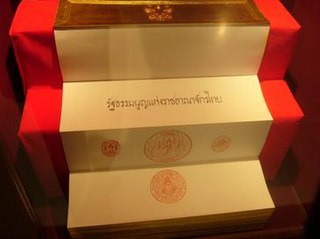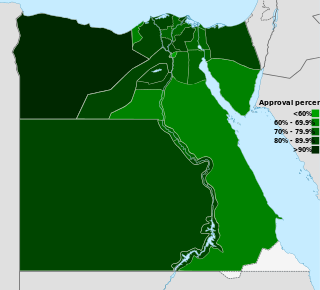
The politics of Kyrgyzstan, officially known as the Kyrgyz Republic, takes place in the framework of a presidential system representative democratic republic, whereby the President is head of state and the Chairman of the Cabinet of Ministers is head of government. Executive power is exercised by the government. Legislative power is vested in both the government and parliament. The Economist Intelligence Unit rated Kyrgyzstan a "hybrid regime" in 2019.

Until 22 May 2014, the politics of Thailand were conducted within the framework of a constitutional monarchy, whereby the prime minister is the head of government and a hereditary monarch is head of state. The judiciary is independent of the executive and the legislative branches.

The Council of Representatives, usually referred to simply as the Parliament is the unicameral legislature of the Republic of Iraq. As of 2020, it comprises 329 seats and meets in Baghdad inside the Green Zone.

The electorate of Iraq went to the polls on 15 October 2005 to vote in a referendum on whether or not to ratify the proposed constitution of Iraq. After 10 days of counting votes, the country's electoral commission announced that the constitution had been approved by a wide margin nationwide. A number of mainly Sunni critics like future deputy prime minister Saleh al-Mutlaq alleged massive irregularities, saying that soldiers broke in to polling stations and changed votes to yes in the crucial province of Nineveh, which was expected by them to provide the third "no" vote.

The House of Representatives is the lower house of the National Assembly of Thailand, the legislative branch of the Thai government. The system of government of Thailand is that of a constitutional monarchy and a parliamentary democracy. The system of the Thai legislative branch is modelled after the Westminster system. The House of Representatives has 500 members, all of which are democratically elected: 400 members were elected through single member constituency elections, while the other 100 are elected through party lists parallel voting. The roles and powers of the House of Representatives were enshrined in the Constitution of 2017 which was amended in 2021.

The Constitution of the Kingdom of Thailand provides the basis for the rule of law in Thailand. Since the abolition of the absolute monarchy in 1932, Thailand has had 20 charters or constitutions, an average of one roughly every four years. Many changes followed military coups, reflecting the high degree of political instability in the country. After each successful coup, military regimes abrogated the existing constitution, generally without public consultation.

The Constitutional Court of the Kingdom of Thailand is an independent Thai court created by the 1997 Constitution with jurisdiction over the constitutionality of parliamentary acts, royal decrees, draft legislation, as well as the appointment and removal of public officials and issues regarding political parties. The current court is part of the judicial branch of the Thai national government.

The Constitution of the Kingdom of Thailand, Buddhist Era 2540 (1997) was a constitution of Thailand enacted on 11 October 1997 to replace the 1991 Constitution, and was widely hailed as a landmark in Thai democratic constitutional reform. The Constitution was repealed by the Council for Democratic Reform on 19 September 2006 following a successful military coup, and was replaced by the 2006 Constitution on 1 October 2006.
The Constitution of the Kingdom of Thailand (Interim), Buddhist Era 2549 (2006) was an interim constitution of Thailand enacted to replace the 1997 Constitution which was repealed by the Council for Democratic Reform (CDR) after it seized power from the government of Thaksin Shinawatra in the 2006 Thailand coup. Released on 27 September 2006 and promulgated on 1 October 2006, the Constitution allowed the junta to retain significant control over the appointed civilian government and the drafting of a permanent constitution. The CDR would be transformed into a permanent Council for National Security (CNS) and would appoint the head of the executive branch, the entire legislature, and the drafters of a permanent constitution. The Constitution made no mention of succession, instead leaving it to "constitutional practice." The draft came under strong public criticism as being a step backwards from the 1997 "People's Constitution". The constitution did not repeal junta bans restricting freedom of speech, assembly, and political activity; these bans were subsequently revoked by an act on 27 December 2006.

General elections were held in Thailand on 23 December. They were the first elections after the Council for National Security, a military junta, had overthrown Thailand's elected government and abrogated the constitution on September 19, 2006. The junta had canceled general elections scheduled for October 2006 and promised new elections within 12 months. The Constitutional Tribunal then outlawed the Thai Rak Thai party, the largest political party in Thailand, and banned TRT executives from contesting in the elections for five years. After their political party had been dissolved, the former TRT members regrouped under the band of People's Power Party (PPP) led by Samak Sundaravej, the seasoned politician. Following its formation, the junta issued a classified order to suppress the activities of the PPP and to frame it for lèse majesté. The order was leaked to the public, leading to a complaint towards the Election Commission from the PPP. However, the Election Commission dismissed the complaint on the grounds that the Council for National Security (CNS) had granted itself immunity in the 2007 Constitution of Thailand.

The Constitution of the Kingdom of Thailand, Buddhist Era 2550 (2007) was the constitution of Thailand which was in effect from 2007 to 2014.

The National Assembly of Thailand is the bicameral legislative branch of the government of Thailand. It convenes in the Sappaya-Sapasathan, Dusit District, Bangkok.

The Government of Thailand, or formally the Royal Thai Government, is the unitary government of the Kingdom of Thailand. The country emerged as a modern nation state after the foundation of the Chakri Dynasty and the city of Bangkok in 1782. The Revolution of 1932 brought an end to absolute monarchy and replaced it with a constitutional monarchy.

A constitutional referendum was held in Kenya on 4 August 2010. Voters were asked whether they approved of a proposed new constitution, which had been passed by the National Assembly on 1 April 2010. The new constitution was seen as a vital step to avoid a repetition of the violent outbursts after the 2007 general elections.

A constitutional referendum was held in Egypt on 19 March 2011, following the 2011 Egyptian revolution. More than 14 million (77%) were in favour, while around 4 million (23%) opposed the changes; 41% of 45 million eligible voters turned out to vote.

The history of Thailand since 2001 has been dominated by the politics surrounding the rise and fall from power of former Prime Minister Thaksin Shinawatra, and subsequent conflicts, first between his supporters and opponents, then over the rising military influence in politics. Thaksin and his Thai Rak Thai Party came to power in 2001 and became very popular among the electorate, especially rural voters. Opponents, however, criticized his authoritarian style and accused him of corruption. Thaksin was deposed in a coup d'état in 2006, and Thailand became embroiled in continuing rounds of political crisis involving elections won by Thaksin's supporters, massive anti-government protests by multiple factions, removals of prime ministers and disbanding of political parties by the judiciary, and two military coups.
The year 2007 was the 226th year of the Rattanakosin Kingdom of Thailand. It was the 62nd year in the reign of King Bhumibol Adulyadej, and is reckoned as year 2550 in the Buddhist Era.

The Constitution of the Kingdom of Thailand (Interim) 2014 was a constitution of Thailand in force between 2014–17.

A constitutional referendum was held in Thailand on 7 August 2016. The charter offered only semi-democracy and was seen to tighten military rule in Thailand. However, it was approved by 61% of voters with a 59% turnout. A second proposal for the next prime minister to be jointly elected by senators and MPs was also approved. However, the opposition groups to the constitution were barred from formally campaigning against it by the military government, while the military government actively campaigned for its adoption.
General elections are scheduled to be held in Thailand on 7 May 2023, after the 25th House of Representatives reaches its four-year term limit.















